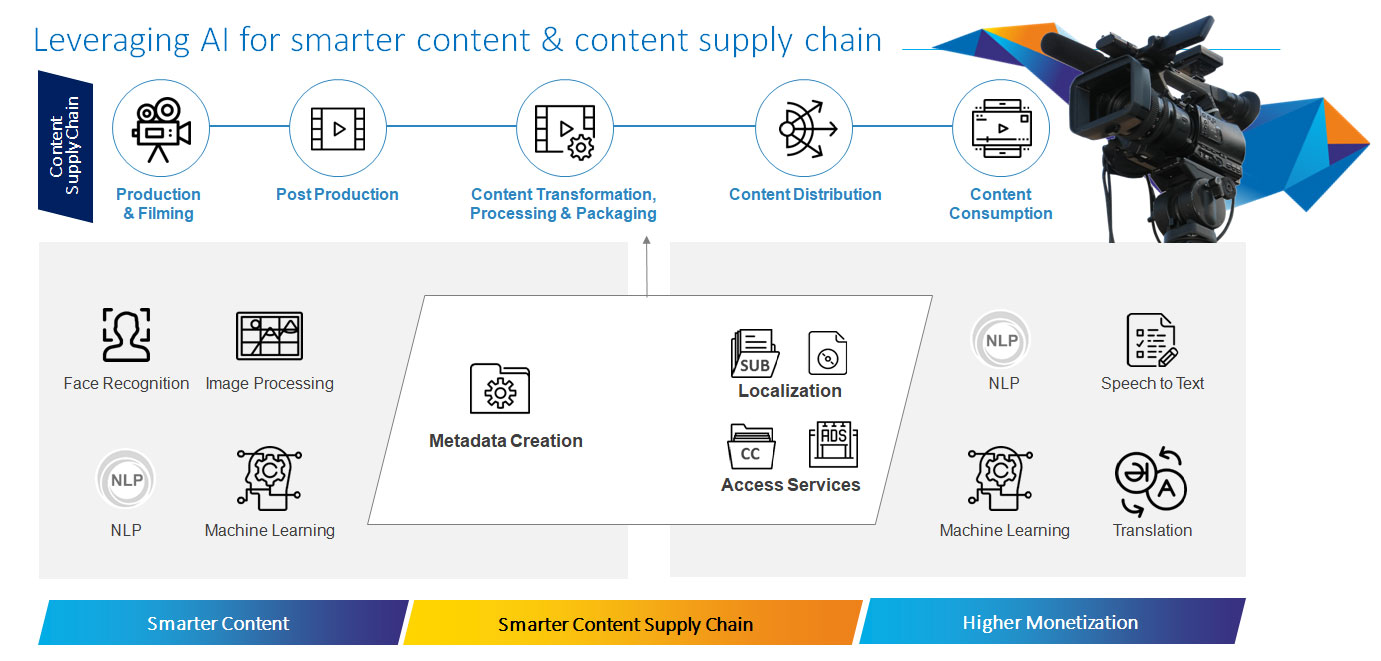Media & Entertainment: Leveraging AI for Smarter Content & Content Supply Chain
Media companies have been shifting their focus from ‘content-centric approach’ to ‘customer-centric approach’ in an attempt to gain ground in a digitally disrupted media world. This shift has been driven by the need for an ability to meet consumer expectations, both in terms of content and in terms of overall content viewing experience. However, customer-centric approach doesn’t imply any lesser significance of content in the overall picture.
Being a primary factor that drives consumer to a given platform, and also being the most important touchpoint between a media company and a consumer, content has always been the king and will most certainly always be. Then what do we mean by a customer-centric approach? Customer-centric approach indicates an approach,where the entire content supply chain, from creation to distribution, is designed to constantly identify customer preferences and to serve them the content and experience aligned to those preferences.
So how do we enable that customer-centric approach? A simple, first and also a very obvious answer will be analytics; but that’s only a part of it. Analytics is as good as data it is applied to, in terms of both depth and volume. A true customer-centric approach can be enabled by building a Smarter Content and a Smarter Content Supply Chain that enable a Media Company to understand their customer much better as compared to what they do by applying analytics on a less advanced or a ‘non-smart’ supply chain.
The content itself and supply chain shall be such that it delivers customer experience, that’s a first imperative, in addition to other desirable outcomes such as speed and efficiencies that may be invisible to consumer, but does have a role to play in overall customer experience. Both smarter content and smarter supply chain will unleash more and more details about consumers that’re fed back into content creation and supply chain decisions.
Artificial intelligence can be of immense help for enabling this smarter content and smarter supply chain. It’s not that it is some new thing happening now, efforts has been made on these things for few years. Apparently, YouTube has been using auto captioning since 2009, but it was able to caption few sound effects few months ago such as laughter and applause. It’s just that recent technological advancement in AI is showing deeper promises, and the focus on leveraging AI will go up the ladder in terms of priority for media companies. AI creating trailer for a Fox movie named ‘Morgan’ and AI co-writing movie premise and plots points for horror movie ‘Impossible Things’, are few instances indicating the potential AI holds for enabling Smarter Content &Smarter Content Supply Chain. The two most relevant applications of AI is in automating temporal metadata creation and content localization, with a given degree of accuracy and acceptance.

Temporal metadata refers to metadata that is applicable for given frames and scenes based on what is being currently played on the timeline. Temporal metadata will include data-points such as actors on screen, scene settings, activity, etc. Temporal metadata enables media companies to transform their content into smart content that will help them understand the customers better.Every activity a customer does, such as skipping a minute of content, replaying a scene, etc., provides media companies with more and more insights on likes and dislikes of consumers individually and of the demographics. Media companies can use these deeper insights in tandem with temporal metadata for better monetization of content leveraging improved personalization and contextual ads. Beyond personalization, temporal metadata has multiple other applications, including identification of S&P edit points for compliance, building content compilations and creating promos, trailers and other marketing content.Currently, media companies are not investing or focussing on building temporal metadata for their content because of costs, time and ROI considerations. Automating temporal metadata creation is gaining traction as a result of advancement in AI technologies, including machine learning, face detection, image processing and natural language processing.
Content localization, on the other hand, is being aggressively done and invested in by media companies fuelled by growing OTT market and international expansion of distribution platforms; with the only major constraints in this part of supply chain being the costs involved (mostly outsourced to localization vendors) and speed of delivery. AI has made significant advancement in the field of translation and natural language processing and is also gaining traction to deliver localisation at lower costs and faster turnaround, enabling a smarter supply chain that delivers at speed.
With continuing advancements and growing adoption of AI, media companies and technology providers can jointly fast track AI adoption for achieving smarter content and content supply chain. While technology partners can leverage their AI technology know-how and experience of deploying AI solutions for other industries, media companies can make their huge content libraries available to their solution partner for training the solution to improve accuracy and confidence level significantly. The ready availability of training data (content library) is a key factor that, in my opinion, will drive adoption and results much faster than any other use-cases and deployments in other industries.
More from Manish Sinha
In today’s world, where calling every industry a ‘technology industry’ is no longer considered…
Digital transformation has become the norm in the Media and Entertainment (M&E) industry,…
Advertising has traditionally been one of the biggest revenue generators for cable network…
The disruptions happening in Media and Entertainment industry are of scale and impact unheard…
Latest Blogs
Last week, I had the privilege of attending Informatica World 2025 in Las Vegas, a landmark…
Core banking platforms like Temenos Transact, FIS® Systematics, Fiserv DNA, Thought Machine,…
We are at a turning point for healthcare. The complexity of healthcare systems, strict regulations,…
Clinical trials evaluate the efficacy and safety of a new drug before it comes into the market.…




